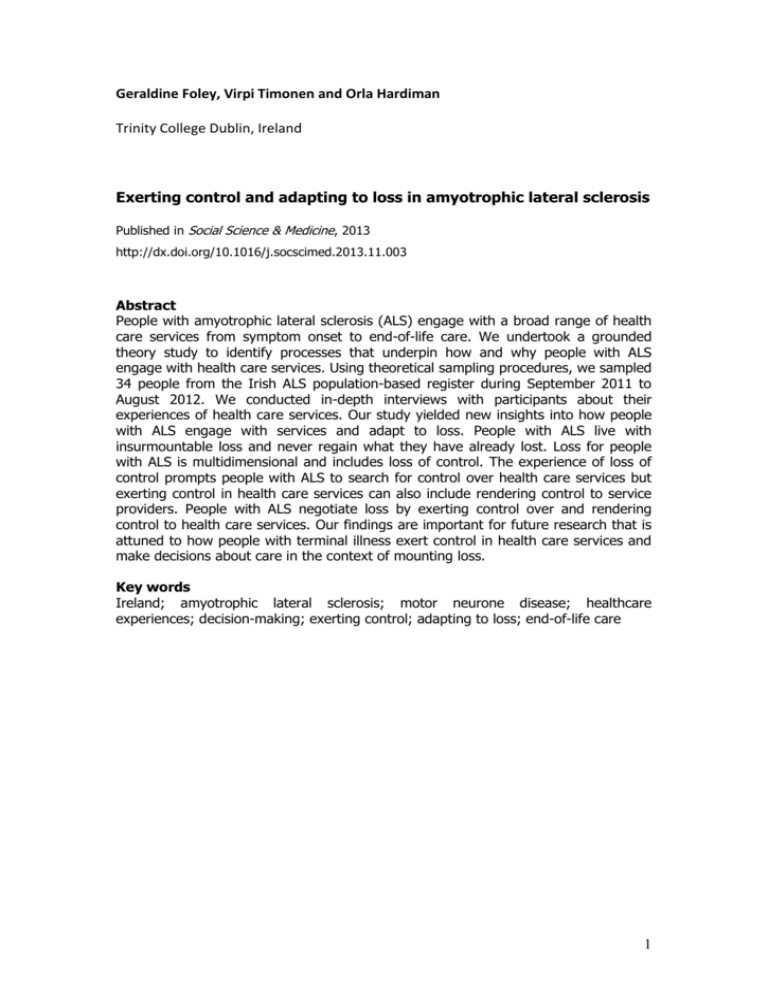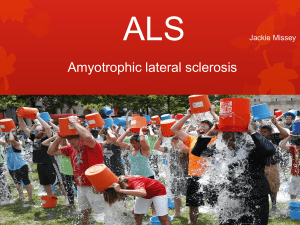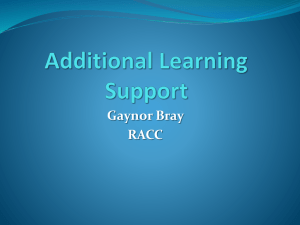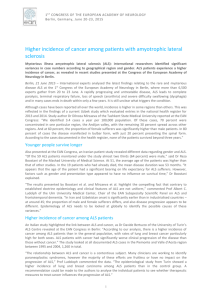Manuscript - edepositIreland
advertisement

Geraldine Foley, Virpi Timonen and Orla Hardiman Trinity College Dublin, Ireland Exerting control and adapting to loss in amyotrophic lateral sclerosis Published in Social Science & Medicine, 2013 http://dx.doi.org/10.1016/j.socscimed.2013.11.003 Abstract People with amyotrophic lateral sclerosis (ALS) engage with a broad range of health care services from symptom onset to end-of-life care. We undertook a grounded theory study to identify processes that underpin how and why people with ALS engage with health care services. Using theoretical sampling procedures, we sampled 34 people from the Irish ALS population-based register during September 2011 to August 2012. We conducted in-depth interviews with participants about their experiences of health care services. Our study yielded new insights into how people with ALS engage with services and adapt to loss. People with ALS live with insurmountable loss and never regain what they have already lost. Loss for people with ALS is multidimensional and includes loss of control. The experience of loss of control prompts people with ALS to search for control over health care services but exerting control in health care services can also include rendering control to service providers. People with ALS negotiate loss by exerting control over and rendering control to health care services. Our findings are important for future research that is attuned to how people with terminal illness exert control in health care services and make decisions about care in the context of mounting loss. Key words Ireland; amyotrophic lateral sclerosis; motor neurone disease; healthcare experiences; decision-making; exerting control; adapting to loss; end-of-life care 1 Introduction Amyotrophic lateral sclerosis (ALS), also known as motor neurone disease or Lou Gehrig’s disease, is a systemic and terminal disorder of the central nervous system which causes paralysis of limb, respiratory and bulbar (swallowing and articulation) muscles and in some cases results in frontotemporal dementia (Hardiman, van den Berg, & Kiernan, 2011). The life time risk of developing the condition is 1:400. ALS is hastily progressive and life expectancy from onset of symptoms is on average two to four years. The care approach in ALS is palliative from point of diagnosis. International standards for best practice focus on multidisciplinary management of symptoms and preservation of quality of life (Andersen et al., 2012; Miller et al., 2009a, 2009b). People with ALS can encounter a broad range of health care professionals as they advance in the disease and make decisions about care that extend from lifesustaining treatments to supportive care (Oliver, Borasio, & Walsh, 2006). Researchers have reported on experiences of health care services in ALS (e.g. Hughes, Sinha, Higginson, Down, & Leigh, 2005) and investigated treatment choices among people with ALS in specific domains of care (e.g. Albert, Murphy, Del Bene, & Rowland, 1999). Multidisciplinary ALS care has achieved positive outcomes in survival (e.g. Traynor, Alexander, Corr, Frost, & Hardiman, 2003) and cost (e.g. Chio, Bottacchi, Buffa, Mutani, & Mora, 2006). However, we identified disparity between positive outcomes in ALS care (as measured by service providers) and service users’ generally low satisfaction with services (Foley, Timonen, & Hardiman, 2012). Rodriguez and Young (2006) found that the views of people with terminal illness regarding their care differ from the views of health care professionals. Entwistle, Firnigi, Ryan, Francis, and Kinghorn (2012) have argued that what matters most to the users of health care is grounded in personal experience. We knew little about how people with ALS construe their experiences as they engage with health care services. We therefore set out to understand and explain how and why people with ALS engage with health care services. In a recent systematic review of qualitative research in ALS, Sakellariou, Boniface, and Brown (2013) called for further exploration of how people with ALS make decisions as they lose control over ALS and attempt to exert control in their lives. Sakellariou et al. (2013) identified that people with ALS feel they do not have any 2 control over the disease but exert control by making choices in life and in healthcare. Biographical and narrative-based research in ALS (Brown & Addington-Hall, 2008; Locock, Ziebland, & Dumelow, 2009) has revealed that people with ALS encounter change in their biographical trajectories. Brown and Addington-Hall (2008) found instances of ‘fracturing’ but also of ‘preserving’, ‘sustaining’, and ‘enduring’ in the narratives of people with ALS. Locock et al. (2009) found that life with ALS is characterised by ‘disruption’ and ‘abruption’ (life ending) but also by ‘repair’ and ‘continuity’ when people seek to regain control and restore normality in their lives. Loss is a universal concept (Murray, 2001) and is closely associated with the experience of illness (e.g. Edmonds, Vivat, Burman, Silber, & Higginson, 2007). Explanatory models of adjustment to loss in terminal illness have been described (e.g. Knight & Emanuel, 2007) and perceptions of loss (including loss of control) are common among people with terminal illness (Kutner, Steiner, Corbett, Jahnigen, & Barton, 1999). The terms ‘perceived control’ and ‘locus of control’ in illness are well documented in social psychology and have already been investigated in ALS (e.g. Goldstein, Atkins, & Leigh, 2003; Plahuta et al., 2002). However, there is a dearth of literature in social science fields that illuminate how people with ALS perceive control or indeed why they feel they lose control. People with ALS equate dignity in dying with being in control and have a strong desire for self determination in end-of-life care (Cooney, Lewando Hundt, Goodall, & Weaver, 2012). Albert et al. (1999) demonstrated that people with ALS make choices about their care and follow up with choices consistent with their preferences for care. People with ALS also have a strong desire for information (Chio et al., 2008; Wicks & Frost, 2008) and become less reliant on health care professionals in decision-making as they advance in the disease (Sulmasy et al., 2007). O’Brien, Whitehead, Murphy, Mitchell, and Jack (2012) reported that people with ALS delayed use of services in their effort to maintain control and normality in their lives. Researchers have described how people with life threatening illness seek to reestablish control in response to loss (Anderson & Asnani, 2013) and investigated control preferences in end-of-life care (Volker & Wu, 2011), but our search did not yield any studies that explored the relationship between losing control in illness and exerting control in health care services. The focus of this article is to further our 3 understanding of what loss means to people with ALS and how people with ALS exert control in their care in response to loss. We demonstrate that exerting control in care is an adaptive response to loss in ALS. We discuss our findings in light of how people with life-limiting illness (including ALS) adapt to loss. Methods We used grounded theory method (Corbin & Strauss, 2008) for this study. Grounded theory is a systematic research approach which builds concepts and theory from qualitative data. The focus in grounded theory is on basic processes of behaviour (i.e. how and why people behave in certain ways) and our aim was to unearth key processes that underpin how people with ALS engage with services. We also aimed to build substantive theory in order to enable comparisons between contexts and further development of theory in relevant substantive areas. Participants Thirty-four people on the Irish ALS population-based register (ca n=265) participated in the study between September 2011 and August 2012. The sample comprised 17 men and 17 women. Age of participants ranged between 37 years and 81 years. All but two participants required assistance for everyday activities. Duration since onset of symptoms among participants ranged between four months and 13 years and the average duration of disease for the sample was 31 months. Nearly a third of the sample (n=10) was deceased when we sampled the 34th participant. The majority of participants (n=27) lived with family. The remaining participants either lived alone or in a care facility. All participants had accessed health care services and eight participants had already engaged with life-sustaining treatments (noninvasive ventilation and/or gastrostomy feeding). All participants were sampled from the national register without any selection by geographical area. This resulted in sampling participants from across the country. Participants varied across socioeconomic status. Table 1 provides additional data on the age profile of the sample. Data collection and analysis As per grounded theory method, we collected and analysed data in tandem, and compared data with data (otherwise known as constant comparison) in order to generate concepts for further sampling (Corbin & Strauss, 2008). We purposively selected participants during the preliminary stages of sampling to capture diversity of 4 experience (Morse, 2007). We then sampled for concepts in the data as we made theoretical comparisons between data. Of those who we asked to participate, ten people declined to participate and three people who had agreed to participate were unable to do so due to rapid deterioration in their condition. We provided each individual who expressed interest in participating with a participant information leaflet and gained full informed consent from each participant. Location for the interview was at the discretion of each participant. All participants who lived at home (n=32) chose their residence as the interview setting. The remaining participants were interviewed in a hospice (n=1) and in an extended care facility (n=1). We conceptualised and theorised from the ground up (Corbin & Strauss, 2008). We opened interviews by asking participants about their experiences of health care services since “MND [ALS] came into their lives” and we integrated questions to explore themes from earlier interviews in subsequent interviews. Interviews contained a mixture of open-ended, probing, prompting, clarifying and verifying questions. Interviews lasted between 40 minutes and 2 hours 10 minutes; the average duration was 1 hour and 20 minutes. Participants’ significant others were present during nine interviews. Anarthric (n=2) participants used high-tech switch activated (n=1) and touch-screen (n=1) alternative and assistive communication (AAC) devices to communicate their responses. All but one of the participants with severe dysarthria (n=6) used low-tech AAC devices (e.g. writing pads) to supplement their responses. Variation in participants’ physical abilities impacted on how interviews were conducted. Interviewing severely dysarthric and anarthric participants often meant that the interviewer spoke more because she had to verify more (paraphrase what she understood the participant to be articulating, and seek confirmation / correction to her understanding). This strategy inevitably shaped how these interviews were conducted but did not diminish participants’ desire to share and expand on their viewpoint. We digitally audio-recorded all interviews and had them professionally transcribed. The first author conducted the interviews and analysed the data. The second author interrogated the first author’s analysis and supervised all study procedures. The third author facilitated sampling and oversaw procedures. We did not return to 5 participants to verify theory (Charmaz, 2006) owing to rapid progression of the disease. Instead, we invited all participants to review their transcript before we analysed the data and verified emerging concepts between interviews. We analysed our interview data (spanning 908 pages and 332,679 words) using open, axial, and selective coding procedures as described by Corbin and Strauss (2008). We broke data down into discrete parts (codes) and abstracted these parts to form concepts. We coded for similarities and differences in the data to build concepts and categories (larger concepts). We paid close attention to participants’ actions / interactions in response to context and we coded comparatively between conditions explicit and implicit in the data. The first author wrote memos to make theoretical comparisons between data and to guide sampling. We used the qualitative software program NVivo9 (QSR International, 2010) as a tool to code data, demonstrate how codes formed concepts and to link memos to codes, concepts, and categories. We stopped sampling when new data no longer added meaning to our concepts and categories. We derived multiple relationships between categories and in turn, identified key processes in the data. Ethics We gained ethical approval from a hospital ethics (medical research) committee of a national neuroscience centre in Ireland and from a research ethical approval committee of Trinity College Dublin, Ireland, to conduct the research. The Irish ALS population-based register is compiled by an Irish ALS research group. The first author signed a confidentiality agreement with the Irish ALS research group to sample from the register. Findings The excerpts presented here illustrate findings that we confirmed across the dataset. Meaning of loss in amyotrophic lateral sclerosis We found that participants perceived loss in ALS as insurmountable. Participants equated living with ALS to a “death sentence” and to a life of unremitting loss. 6 [What is] very difficult in this whole [swears] disease, it seems to be one step forwards and two steps backwards, the whole time … You always feel you are losing. (Male, age 51) You see MND [ALS] is the worst neurological condition one could get … This for me has taken away so much. It’s going in the direction of taking all my faculties, my independence, my speech, my mobility, concentration, eating … everything I was doing is now gone. (Female, age 67) Participants’ perceptions of loss were not only formed by their awareness of physical change but also by their awareness of how their ability to engage in important aspects of life (e.g. family, parenthood, leisure) was disintegrating and/or had already disintegrated: What was important to me was always the family, then food, drink and conversation … I can’t do anything of it now … huge, unbelievable loss. (Male, age 67) I can’t hug my daughter, enormous loss, it’s incredible (tearful). (Male, age 47) I'm just lying here, I’ve no future. I can’t do activities … I can’t even go for a walk with my dog, and we used to walk for miles and miles and when I say miles, I mean miles. (Male, age 81) Indeed, some participants suggested they were “robbed” of their identity because of unremitting loss: It [ALS] turned me into an old man overnight because suddenly you’re going with a walking stick and then you’re with a rollator, now you’re in this wheelchair and you’ve really, it’s just a robbery of everything. (Male, age 52) Losing hope and ‘losing out on the future’ were two primary dimensions to participants’ experience of loss. Participants’ growing awareness of the limitations imposed on them by ALS diminished hope of a future and most suggested that their 7 hope diminished in line with mounting loss. Some participants suggested that there is no hope in ALS in the context of the incurable nature of the condition: You see motor neurone is without hope. You can’t treat it and you can’t get well … So cancer you can treat and get well … With motor neurone there is no way out of your situation, can't be improved. It’s a funny disease in that way that it’s without hope and that’s the worst feature of it. (Male, age 67) Participants’ attention to what they had not yet lost (e.g. residual abilities, engagement with family) energised some in their struggle to regain normality. However, participants’ fight to regain normality was unsuccessful due to unremitting loss: I get very emotional when I think about what I have lost … When I was diagnosed I was walking with a limp but no aids. Within six months I was needing to use a frame because I kept falling over. Within nine months I needed people to walk with me. Within a year I could hardly do two steps … There is so little time to take it on board, it’s [loss] incessant … The future is so grim because of all the loss. (Female, age 58) Participants felt powerless in the face of loss and were resigned to the likelihood of more loss. Losing control over ALS and over their lives was central to participants’ experience of loss and all participants spoke openly about the uncontrollable nature of ALS. Moreover, participants indicated they had no control over loss: I think there’s more happening than people can see or realise. Personally I think it’s [that] my own body is withdrawing from my old life … I’m discarding all the things that I used to do, used to enjoy. I’m not doing it deliberately … My body is saying you know pull back from that and that’s what’s happening. (Male, age 73) Losing control comprised “having no choice” and we found that participants felt forced to adapt to and in some cases, accept ALS and health care services because of uncontrollable loss: 8 I know I can’t walk so I have to use a wheelchair. I know I can’t stand up so I have to be lifted up and I have to be hoisted into bed and hoisted onto the toilet. So like I mean you have to accept it if you like … You don’t have a choice. I mean if you are sitting there and you can’t get up, what choice have you only to be lifted up. (Female, age 51) Some participants attempted to resist loss by exerting control in their lives. Exerting control in life comprised focusing on the present and attempting to engage in ‘normal’ activities. As one participant disclosed: I take each day as it comes … I don’t want to let my mind run away … I try to do the things that I have always done … I think if I don’t, I will have given up … I feel I don’t have energy but it doesn’t stop me trying. I still go up to the shops. As soon as you [interviewer] are gone I’ll be up to the shops. (Female, age 62) However, as exemplified by the following excerpt, the experience of unremitting loss fuelled awareness among participants that it was impossible for them to arrest the loss (including loss of control) they encountered in their lives: I find myself in a constant battle day after day because [of] this MND [ALS] alien that has taken over my body and that I have not too much defence against. Normally in a war you win some battles. I’m losing all the battles and I know for a fact I’m going to lose the war. The war, the war is lost already because MND is going to take me anyhow but I’m not winning any battles because I feel that I don’t have, the arms that I’m provided with in no way can defeat or even hold back this alien that is taking me over. (Male, age 73) Exerting control over health care services We found that participants’ perceptions of losing control over ALS and their lives prompted them to exert control in their interactions with service providers. Important for participants was to be in control of their care and exerting control over health care services fostered feelings of control among participants. Participants explained how exerting control over and remaining in control of services fostered control: 9 I'm hoping it [speech] will stay as it is (sigh) but if I do lose it, yes I would be looking for the devices to communicate … [because] I have to be in control … otherwise if I weren’t in control I'd have let the public health nurse stick a blooming [damned] catheter in and look at all the issues you have with them. (Female, age 58) I’m not going into a nursing home. I’ll die before I go into one of them … I think going to a nursing home it just makes me feel well, not in control … I’d be treated good alright but it’s still not the same thing (Male, age 37) Exerting control in health care services assisted some participants to focus on the present as they struggled to maintain normality. A participant who was increasingly dysphagic (difficulty in swallowing) disclosed why she opted for the time being against a gastrostomy feed recommended to her by a consultant neurologist: Participant (P): I told her I lost weight and she [consultant neurologist] asked me did I want, what are they called, a … (participant pointing to her abdomen). Interviewer: A feed through your tummy [abdomen]. P: Yeah and I said no … Oh I don’t want one until I feel the need … I don’t like to know in advance what is coming … It would play on my mind. (Female, age 62) Participants engaged with health care services in line with their own perceptions of mounting disability and when participants themselves judged that such services were required. Consequently, participants exerted control by deciding when to engage with services. A participant with dysarthria disclosed: Well I suppose if I was working outside the home I would be using my voice more whereas I’m here a lot on my own, my only social is playing golf, so I feel that I’m doing ok … I do find it difficult talking but I don’t have to talk. You see that’s why I feel that I don’t need to see a speech therapist [locally] yet. (Female, age 64) 10 Indeed, some participants indicated that they would disengage from health care professionals if they felt their preferences for care were ignored by health care professionals: Well I wouldn’t go back to them (laugh). I definitely wouldn’t go back to them. I’d say no I’m not coming back and that’s it. (Female, age 51) We found that participants resented having to use assistive devices because assistive devices reminded them of what they had already lost. In this light, participants exerted control over service providers by declining assistive devices. Declining assistive devices until essential to function was emblematic of how participants negotiated loss: Three or four months ago the OT [occupational therapist] was here and I says how do you see this going and she says “I see a wheelchair”. I said [swears] no way, absolutely no way … at the time I was on a crutch … now that this leg is gone and this leg is just beginning to go, I’m hoping that when I go into the wheelchair I’ll have use of the manual wheelchair for years. I’m hoping I will … Now you know if I end up at Christmas having to get an electric wheelchair, that will be hard to take. (Male, age 51) Losing control over ALS in some cases accentuated participants’ fears and anxieties about the final stages of ALS and about end-of-life care. Participants expressed a strong desire to be in control of end-of-life care. The majority of participants spoke openly about death and dying and most participants felt they had the right to sustain or end their life on their terms. Exerting control in end-of-life care assisted participants to process loss: When you get to a stage where the only thing you can move is your eyelid you wonder whether you are kind of just existing. I know your brain is alert and you feel, you know you’ve got your sense of touch …[but] if I got to the stage where I was just existing I would be leaning towards going to Switzerland [for assisted suicide]. (Male, age 41) 11 Participants shared a strong desire to follow through with their own preferences for care and making decisions about care based on their preferences fostered feelings of control among participants. Participants who had already made decisions about endof-life felt care in control of their care. As one participant disclosed: Participant (P): Well I'd listen to advice. But I mean the plan is going ahead. I mean I’ve made my plans … I am very happy living here [home] and I plan to stay on here … I definitely have instructions left that I don’t want to be fed by you know the … Interviewer: The RIG [gastrostomy feed], PEG [gastrostomy feed], so you don’t want one of them? P: Yeah. So that's in place … I’ve given in the forms for eh brain donation … and I mean I'm quite happy about DNA and whatever … I'm free to make the choice. (Female, age 73) Some participants sensed that control inevitably shifted away from service users and towards service providers because service users rendered more control to service providers as they advanced in the condition. However, seeking time and space from service providers enabled participants to “digest” loss and having time to “digest” loss fostered feelings of control for participants: During this summer just gone by I didn’t want to be making calls to physio[therapy], occupational therapy, district nurse … I wanted a holiday from the disease … I’m processing it [ALS], I know it’s there and when I’m ready I’ll have no problem with it. (Female, age 45) We also found that participants’ rendering of control to service providers enabled them to feel in control of their care because exerting control in health care services also included the freedom to relinquish control on their own terms. Figure 1 illustrates the cyclical nature of how participants exerted control and remained in control of their care by accepting help on their own terms. Accordingly, engaging with services on their own terms fostered feelings of control. As another participant commented: 12 I could probably go on indefinitely and not go back to the [ALS] clinic … I'm going to avoid doing that for as long as I can … at some point I actually do need to go back … [but] that is my choice. (Female, age 45) Indeed, engaging with services on their own terms helped participants come to terms with loss. As illustrated by the following excerpt, participants engaged with health care services to be in control of care and adapt to loss: I think as I say that when you have a pain, you say I need a pain killer. My breathing is changing but I don’t want to lose control. So if you need to breathe you have to say I need that [noninvasive ventilation] to be in control. (Female, age 62) Discussion Our findings yield new insights into how people with ALS experience loss, engage with health care services and adapt to loss. We found that loss in ALS was unremitting, insurmountable, and accelerated with disease progression. Loss of control in ALS is central to loss in ALS. People with ALS lose control over their life and feel unable to control the losses they encounter in ALS. Adaptation for people with ALS involves adapting to loss without the ability to control loss. People with ALS exert control over health care services as they search for control. Exerting control in care enables people with ALS to feel in control of care. Feeling in control of care helps people with ALS to adapt to unremitting loss (Figure 1). Our findings resonate with and differ from those of Locock et al. (2009) and Brown and Addington-Hall (2008). As Locock et al., we identified biographical abruption and disruption in ALS. However, Locock et al. also detected biographical repair in ALS that comprised regaining control, restoring normality or creating a new normality. Brown and Addington-Hall (2008) reported that some people with ALS might also ‘preserve’ and ‘sustain’. In contrast, our data suggest people with ALS might not regain, maintain, or sustain as they adapt to loss. In our study, participants found solace in focusing on the present but none managed to hold onto normality or indeed find a ‘new’ normality because of unremitting loss (including loss of control). All participants were also resigned to more immediate loss. It is possible that people with ALS fail to repair or restore because they live with unremitting loss that is 13 beyond their control. Our data do, however, support the concept of ‘continuity’ (Locock et al. 2009) and of ‘enduring’ (Brown & Addington-Hall, 2008) in ALS. We found that the majority of participants felt they had no choice but to live on with unremitting loss. Locock at al. (2009) and Brown and Addington-Hall (2008) conducted biographical and narrative-based studies. Using grounded theory method, we saturated key categories (i.e. loss and control) in terms of their properties and dimensions (Corbin & Strauss, 2008). In doing so, we captured the magnitude of loss in ALS. Locock et al. and Brown and Addington-Hall included in their studies participants with primary muscular atrophy (PMA) and participants with primary lateral sclerosis (PLS). PMA and PLS are highly disabling motor neuron disorders but they differ in disease trajectory to ALS. PMA and PLS are more slowly progressive than ALS. All participants in our study had a diagnosis of ALS. Difference in disease trajectory between ALS and other variants of motor neurone disease contextualises the difference in findings between these studies and ours. Our findings depict a clear distinction between people with ALS and others who incur loss over a prolonged period of time and/or who regain some of what they have already lost through periods of disease remission or stability (e.g. Multiple Sclerosis, HIV). ALS is rapidly progressive and has no periods of remission. Charmaz (1995) suggests that people with chronic illness establish altered identities to adapt to loss. The clinical course of ALS differs greatly from the disease trajectories of chronic conditions. Most of our participants indicated that ALS offered little time to adjust to the illness. Participants struggled to find a meaningful existence because of the unrelenting nature of ALS and the subsequent unremitting loss they encountered in ALS. Our findings with respect to loss resonate somewhat with those of other researchers who have investigated the experiences of people in palliative care. People with advanced cancer also encounter multiple losses and grieve current and future loss (Cheng, Lo, Chan, Kwan, & Woo, 2010). Broom and Cavenagh (2011) found that living with terminal illness comprised a liminal state, bereft of parts which people had previously recognised as components of their life. However, we found no palliative care studies which illustrate the unremitting nature of loss that we found in our 14 study. Instead, Reeve, Lloyd-Williams, Payne, and Dowrick (2010) reported that people with terminal cancer managed to maintain an overall sense of well-being in the face of loss. The disease trajectories in terminal malignant disease are diverse. In comparison to cancer, ALS is in most cases relentless from outset, with little effective treatment available to service users. In addition, people with terminal cancer can encounter a somewhat more uncertain disease trajectory where periods of remission or stability may offer hope of survival (Astrow et al., 2008). In our study, we found that participants did not maintain an overall sense of well-being because their losses never ceased at any point in time. Our findings resonate with studies in palliative care that reported on how people with terminal illness lose control (Kutner et al., 1999) and have a strong desire to be in control (Chapple, Ziebland, McPherson, & Herxheimer, 2006). Our findings are both similar and contrary to research into the adaptive role of perceived control in cancer. Ranchor et al. (2010) also found that people with cancer felt less in control following their diagnosis but unlike our participants, regained some control. Our findings shed light on how and why people with ALS engage with health care services. People with ALS engage with services to exert control over health care services and to feel in control of care. People with ALS search for control in health care services because they perceive loss of control in other dimensions of life. As stated, few researchers have reported on psychosocial processes surrounding control in ALS care. We found that being in control of care was of huge importance to participants and participants felt in control of care when they made decisions about their care. Feeling in control of care included the right to accept and decline services as participants pleased. Participants engaged with health care services on their own terms and were likely to disengage from health care services if they did not feel in control in decision-making about care. As for Cooney et al. (2012), feeling in control of end-of-life care meant having the right to decide about end-of-life care. Our findings emphasise the importance of enabling people with ALS to be in control of their care as they adapt to insurmountable loss in their lives. We identified that participants felt most in control of their care when they decided to engage with services and when they had choices about care. We argue that engaging with ALS service users when they are ready to engage and providing people with ALS with 15 options about their care, can foster control among people with ALS. International guidelines in ALS care (Andersen et al., 2012; Miller et al., 2009a, 2009b) encourage early initiation of multidisciplinary care. However, we found that people with ALS move at different rates towards acceptance of ALS and exert control in care in order to adapt to loss. Service providers need to pay attention to the timing of interventions in ALS care because people with ALS exert control in care by deciding how and when they engage with services. Sakellariou et al. (2013) suggested that people with ALS seek to maintain control in their lives by making active choices about care. However, our data suggest that people with ALS construe control in life differently to how they construe control in health care services. Our participants engaged with health care services on their own terms to be in control of care but equated living with ALS to a life of unremitting loss which included loss of control. We found that participants perceived they never regained control in their lives. In our study, people with ALS engaged with health care services to adapt to loss. Conclusion Based on 34 interviews with participants who we theoretically sampled in one country, our findings are not representative of the global ALS population. However, at a substantive level, we identified key processes that explain how people with ALS engage with health care services and adapt to loss. We designed our research so that it could be replicated in other country/systemic contexts enabling further theory development. Our findings have implications for clinical practice in the field. First, we paid close attention to how participants constructed their experiences of health care services in the context of social structures (Corbin & Strauss, 2008) but we did not identify structures beyond health care services that fostered feelings of control among participants. We postulate that service providers are primary enablers (or at least have the potential to be primary enablers) for people with ALS to exert control. Second, losing control and fighting to remain in control comprised two central components in how participants interacted with service providers. Participants negotiated loss via engaging with services on their own terms. Hence, we also 16 postulate that people with ALS are more likely to accept assistance from health care services when they perceive assistance to be on their own terms. We have identified that control and loss are key variables that shape how people with ALS engage with health care services and we have shed light on the complex relationship between loss and control in ALS. The relationship between loss and control in terminal illness is amenable to further theoretical development and testing. Our findings are pertinent for research that is attuned to how people with conditions of similar disease trajectories construe loss and exert control in health care services. References Albert, S. M., Murphy, P. L., Del Bene, M. L., & Rowland, L. P. (1999). A prospective study of preferences and actual treatment choices in ALS. Neurology, 53(2), 278-283 Andersen, P. M., Abrahams, S., Borasio, G. D., de Carvalho, M., Chio, A., Van Damme, P., et al. (2012). EFNS guidelines on the clinical management of amyotrophic lateral sclerosis (MALS) – revised report of an EFNS task force. European Journal of Neurology, 19(3), 360-375 Anderson, M., & Asnani, M. (2013). “You just have to live with it”: Coping with sickle cell disease in Jamaica. Qualitative Heath Research, 23(5), 655-664 Astrow, A. B., Sood, J. R., Nolan, M. T., Terry, P. B., Clawson, L., Kub, J., et al. (2008). Decision-making in patients with advanced cancer compared with amyotrophic lateral sclerosis. Journal of Medical Ethics, 34(9), 664-668 Broom, A., & Cavenagh, J. (2011). On the meanings and experiences of living and dying in an Australian hospice. Health, 15(1), 96-111 Brown, J., & Addington-Hall, J. (2008). How people with motor neurone disease talk about living with their illness: a narrative study. Journal of Advanced Nursing, 62(2), 200-208 17 Chapple, A., Ziebland, S., McPherson, A., & Herxheimer, A. (2006). What people close to death say about euthanasia and assisted suicide: a qualitative study. Journal of Medical Ethics, 32(12), 706-710 Charmaz, K. (2006). Constructing grounded theory. A practical guide through qualitative analysis. London: Sage Charmaz, K. (1995). The body, identity, and self: adapting to impairment. Sociological Quarterly, 36(4), 657-680 Cheng, J. O. Y., Lo, R. S. K., Chan, F. M. Y., Kwan, B. H. F., & Woo, J. (2010). An exploration of anticipatory grief in advanced cancer patients. Psycho-Oncology, 19(7), 693-700 Chio, A., Bottacchi, A., Buffa, C., Mutani, R., & Mora, G. (2006). Positive effects of tertiary centres for amyotrophic lateral sclerosis on outcome and use of hospital facilities. Journal of Neurology, Neurosurgery and Psychiatry, 77(8), 948-950 Chio, A., Montuschi, A., Cammarosano, S., De Mercanti, S., Cavallo, E., Ilardi, A., et al. (2008). ALS patients and caregivers communication preferences and information seeking behaviour. European Journal of Neurology, 15(1), 55-60 Cooney, G., Lewando Hundt, G., Goodall, G., & Weaver, J. (2012). Choices and control when you have a life-shortening illness. Researching the views of people with motor neurone disease. Oxford: Picker Institute Europe. Accessed April 2013. http://www.mndassociation.org/Resources/MNDA/Life%20with%20MND/Documents/ Choices%20and%20control%20FINAL.pdf Corbin, J., & Strauss, A. (2008). Basics of qualitative research. Techniques and procedures for developing grounded theory (3rd Edition). London: Sage Edmonds, P., Vivat, B., Burman, R., Silber, E., & Higginson, I. J. (2007). Loss and change: experiences of people severely affected by multiple sclerosis. Palliative Medicine, 21(2), 101-107 18 Entwistle, V., Firnigi, D., Ryan, M., Francis, J., & Kinghorn, P. (2012). Which experiences of health care delivery matter to service users and why? A critical interpretive synthesis and conceptual map. Journal of Health Services Research and Policy, 17(2), 70-78 Foley, G., Timonen, V., & Hardiman, O. (2012). Experience of services as a key outcome in amyotrophic lateral sclerosis (ALS) care: The case for a better understanding of patient experiences. American Journal of Hospice and Palliative Medicine, 29(5), 362-367 Goldstein, L. H., Atkins, L., & Leigh, P. N. (2003). Health-related locus of control: does it change in motor neurone disease (MND)? Amyotrophic Lateral Sclerosis and Other Motor Neuron Disorders, 4(1), 27-30 Hardiman, O., van den Berg, L. H., & Kiernan, M. C. (2011). Clinical diagnosis and management of amyotrophic lateral sclerosis. Nature Reviews Neurology, 7(11), 639649 Hughes, R. A, Sinha, A., Higginson, I., Down, K., & Leigh, P. N. (2005). Living with motor neurone disease: lives, experiences of services and suggestions for change. Health and Social Care in the Community, 13(1), 64-74 Knight, S. J., & Emanuel, L. (2007). Processes of adjustment to end-of-life losses: a reintegration model. Journal of Palliative Medicine, 10(5), 1190-1198 Kutner, J. S., Steiner, J. F., Corbett, K. K., Jahnigen, D. W., & Barton, P. L. (1999). Information needs in terminal illness. Social Science and Medicine, 48(10), 13411352 Locock, L., Ziebland, S., & Dumelow, C. (2009). Biographical disruption, abruption and repair in the context of motor neurone disease. Sociology of Health and Illness, 31(7), 1043-1058 Miller, R. G., Jackson, C. E., Kasarskis, E. J., England, J. D., Forshew, D., Johnston, W., et al. (2009a). Practice parameter update: the care of the patient with 19 amyotrophic lateral sclerosis: drug, nutritional, and respiratory therapies (an evidence-based review): report of the Quality Standards Subcommittee of the American Academy of Neurology, Neurology, 73(15), 1218-1226 Miller, R. G., Jackson, C. E., Kasarskis, E. J., England, J. D., Forshew, D., Johnston, W. et al. (2009b). Practice parameter update: the care of the patient with amyotrophic lateral sclerosis: multidisciplinary care, symptom management, and cognitive/behavioural impairment (an evidence-based review): report of the Quality Standards Subcommittee of the American Academy of Neurology. Neurology, 73(15), 1227-1233 Morse, J. M. (2007). Sampling in grounded theory. In A. Bryant & K. Charmaz (Eds.), The SAGE handbook of grounded theory (pp.229-244). London: Sage Murray, J. A. (2001). Loss as a universal concept: A review of the literature to identify common aspects of loss in diverse situations. Journal of Loss and Trauma, 6(3), 219-241 O’Brien, M. R., Whitehead, B., Murphy, P. N., Mitchell, J. D., & Jack, B. A. (2012). Social services homecare for people with motor neurone disease/amyotrophic lateral sclerosis: why are such services used or refused? Palliative Medicine, 26(2), 123-131 Oliver, D., Borasio, G. D., & Walsh, D. (2006). Palliative care in amyotrophic lateral sclerosis. From diagnosis to bereavement. Oxford: Oxford University Press Plahuta, J. M., McCulloch, B. J., Kasarskis, E. J., Ross, M. A., Walter, R. A., & McDonald, E. R. (2002). Amyotrophic lateral sclerosis and hopelessness: psychosocial factors. Social Science and Medicine, 55(12), 2131-2140 QSR International. (2010). NVivo qualitative data analysis software. Version 9. QSR International Pty Ltd. Ranchor, A. V., Wardle, J., Steptoe, A., Henselmans, I., Ormel, J., & Sanderman, R. (2010). The adaptive role of perceived control before and after cancer diagnosis: A prospective study. Social Science and Medicine, 70(11), 1825-1831 20 Reeve, J., Lloyd-Williams, M., Payne, S., & Dowrick, C. (2010). Revisiting biographical disruption: exploring individual embodied illness experience in people with terminal cancer. Health, 14(2), 178-195 Rodriguez, K. L., & Young, A. J. (2006). Patients’ and healthcare providers’ understandings of life-sustaining treatment: are perceptions of goals shared or divergent? Social Science and Medicine, 62(1), 125-133 Sakellariou, D., Boniface, G., & Brown, P. (2013). Experiences of living with motor neurone disease: a review of qualitative research. Disability and Rehabilitation, 35(21), 1765-1773 Sulmasy, D. P., Hughes, M. T., Thompson, R. E., Astrow, A. B., Terry, P. B., Kub, J., et al. (2007). How would terminally ill patients have others make decisions for them in the event of decisional incapacity? A longitudinal study. Journal of the American Geriatrics Society, 55(12), 1981-1988 Traynor, B. J., Alexander, M., Corr, B., Frost, E., & Hardiman, O. (2003). Effect of a multidisciplinary amyotrophic lateral sclerosis (ALS) clinic on ALS survival: A population based study, 1996-2000. Journal of Neurology, Neurosurgery and Psychiatry, 74(9), 1258-1261 Volker, D. L., & Wu, H. L. (2011). Cancer patients’ preferences for control at the end of life. Qualitative Health Research, 21(12), 1618-1631 Wicks, P., & Frost, J. (2008). ALS patients request more information about cognitive symptoms. European Journal of Neurology, 15(5), 497-500 21 Table 1 Age profile of participants. ____________________________________________________________ Age Men Women Total _____________________________________________________________________ 20-39 years 1 1 2 40-49 years 3 2 5 50-59 years 2 6 8 60-69 years 6 6 12 70-79 years 2 2 4 ≥ 80 years 3 0 3 ______________________________________________________________________ Total 17 17 34 _____________________________________________________________ Adapting to loss Loss Future Hope Parenthood Normality Rendering control on own terms Participation Independence Feeling in control of care Fosters control Expectations Identity Control (No control over loss) Exerting control in care Fig. 1 Exerting control and adapting to loss in ALS 22








